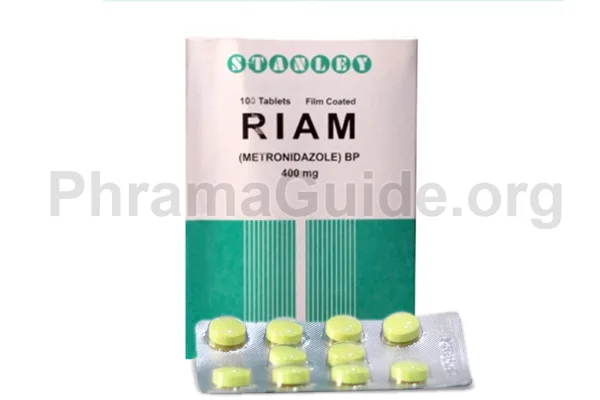Riam tablet is a medication that is used to treat intestinal infections including parasitic diarrhea, bacterial vaginosis, and dental infections. It belongs to the class of nitroimidazole antibiotics that help to eradicate infections caused by anaerobic bacteria and protozoa. Following are some common and off-label uses of the Riam Tablet:
Common Uses of Riam Tablet
- Bacterial Infections: Riam tablet is commonly used to treat bacterial infections of the skin, respiratory tract, abdomen, and genital tract. It is effective against a range of bacteria, including those that are resistant to other antibiotics.
- Parasitic Infections: Riam tablet is also used to treat parasitic infections caused by protozoa, such as giardiasis, trichomoniasis, and amebiasis.
- Dental Infections: Riam tablets may treat dental infections, such as periodontitis and dental abscesses.
- Helicobacter Pylori Infection: Riam tablet is used as a part of the treatment regimen for Helicobacter pylori infection, a bacterial infection that can cause peptic ulcers and gastritis.
- Inflammatory Bowel Disease: Besides its antimicrobial effects, the Riam tablet also has anti-inflammatory properties. As a result, it is sometimes used to treat inflammatory bowel diseases, such as Crohn’s disease and ulcerative colitis.
Other Uses of Riam Tablet
Riam is also used in conditions like:
- Acute Gingivitis
- Moebiasis
- Giardiasis
- Lung Cancer
- Pancreatic Cancer
- Pelvic Inflammatory Disease
- Trichomoniasis
- Urogenital Trichomoniasis
Riam tablet also can be used in adjunctive therapy as an alternative drug of choice in amoebic liver abscess, bacterial vaginosis, clostridium difficile colitis, and Crohn’s disease.

What is Riam?
Riam is one of the leading brands of Metronidazole, manufactured and marketed by Stanley Pharmaceuticals (Pvt) Ltd, Pakistan.
Riam Alternatives : Other Similar Brands
The following are some alternative brands of Riam and their manufacturers.
- Flagyl : Sanofi Aventis (Pakistan) Ltd.
- Metrozine : Searle Pakistan (Pvt) Ltd.
- Gramex : Platinum Pharmaceuticals (Pvt) Ltd, Pakistan
- Klint : Sami Pharmaceuticals (Pvt) Ltd, Pakistan.
- Abozole : Abbott Laboratories (Pakistan) Ltd.
- Metni V : Shaigan Pharmaceuticals (Pvt) Ltd, Pakistan.
- Metrida : Zafa Pharmaceutical Laboratories (Pvt) Ltd, Pakistan.
- Neometin : Genom Pharmaceuticals (Pvt) Ltd, Pakistan.
- Amezole : Ferozsons Laboratories Ltd. Pakistan.
- Danizol : Don Valley Pharmaceuticals (Pvt) Ltd, Pakistan.
- Flezole : Pearl Pharmaceuticals, Pakistan.
Riam : Available Formulations and Strengths
Presently, Riam is available in Tablet and Suspension Forms.
Riam Tablet : 400mg strength.
Riam Syrup : 200mg/5ml strength.
Who Should Not Use Riam?
The contraindications of Riam include:
Hypersensitivity: Riam should not be used in patients with a known history of hypersensitivity or allergic reactions to Riam or other nitroimidazole derivatives.
Blood Disorders: Riam may cause blood disorders such as leukopenia, neutropenia, agranulocytosis, and thrombocytopenia. It is contraindicated in patients with a history of blood disorders.
Pregnancy and Breastfeeding: Riam should not be used during the first trimester of pregnancy. It may be used during the second and third trimesters only if the benefits outweigh the risks. It is also contraindicated during breastfeeding.
Liver Disease: Riam is metabolized in the liver, and it may accumulate in patients with liver disease, causing toxicity. It is contraindicated in patients with severe liver disease.
Central Nervous System (CNS) Disorders: Riam may cause CNS disorders such as seizures and peripheral neuropathy. It should be used with caution in patients with CNS disorders, such as epilepsy.
Alcohol Consumption: Riam should not be used in patients who consume alcohol or alcohol-containing products as it may cause a disulfiram-like reaction, leading to symptoms such as nausea, vomiting, flushing, and palpitations.
What is the Recommended Daily Dosage of Riam?
The daily recommended dose of Riam depends on the type and severity of the infection being treated, as well as the patient’s age, weight, and medical history.
The following are general dosing guidelines:
Bacterial Vaginosis: The dose is one tablet of Riam twice a day and a therapy for 7 days.
Trichomoniasis: The dose is 5 tablets of Riam as a single dose.
Anaerobic Infections: The is one tablet of Riam every 6 hours.
Helicobacter Pylori Infection: The dose is one tablet of Riam twice a day and therapy for 7 days, in combination with other antibiotics.
How Riam Works?
Riam works by causing DNA damage, leading to the death of bacteria and protozoa. It targets the DNA of bacteria by inhibiting the synthesis of nucleic acids and proteins in a bacterial cell.

Leave A Comment